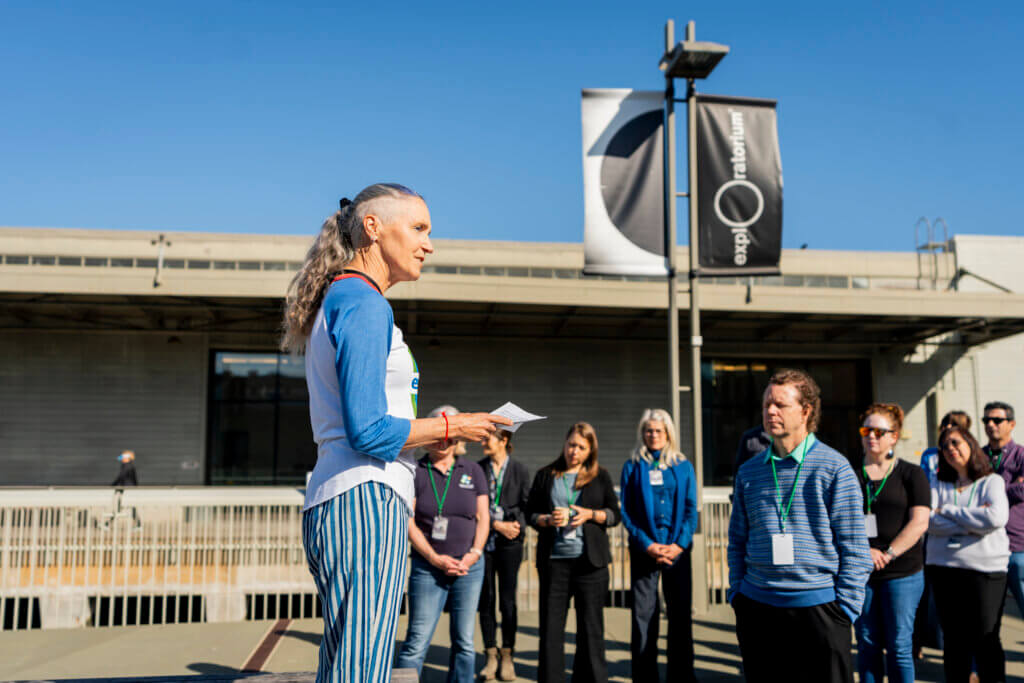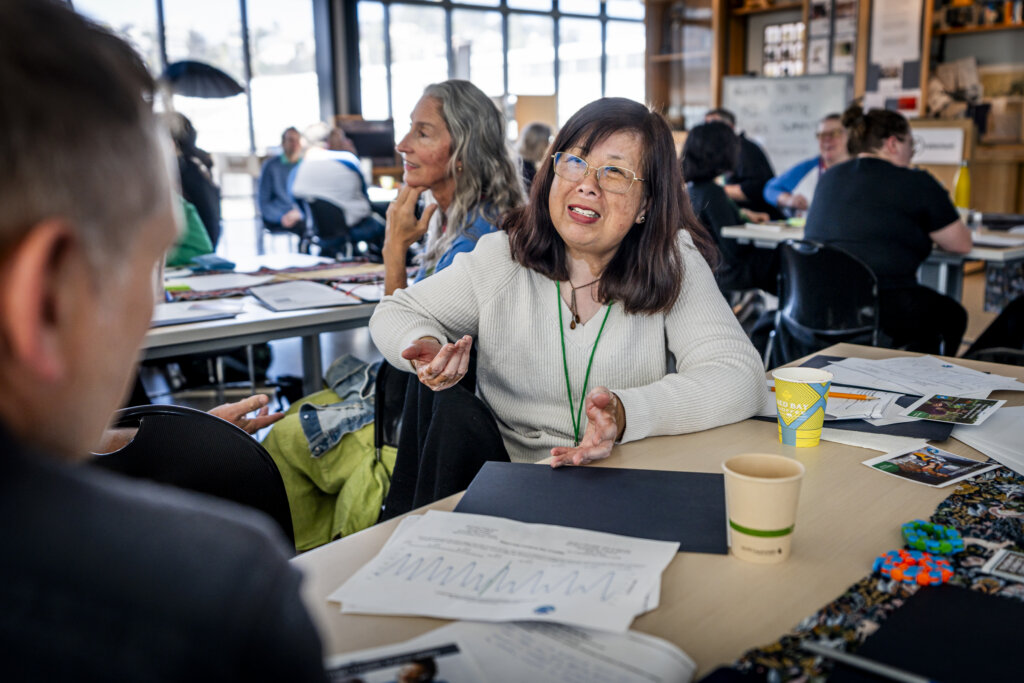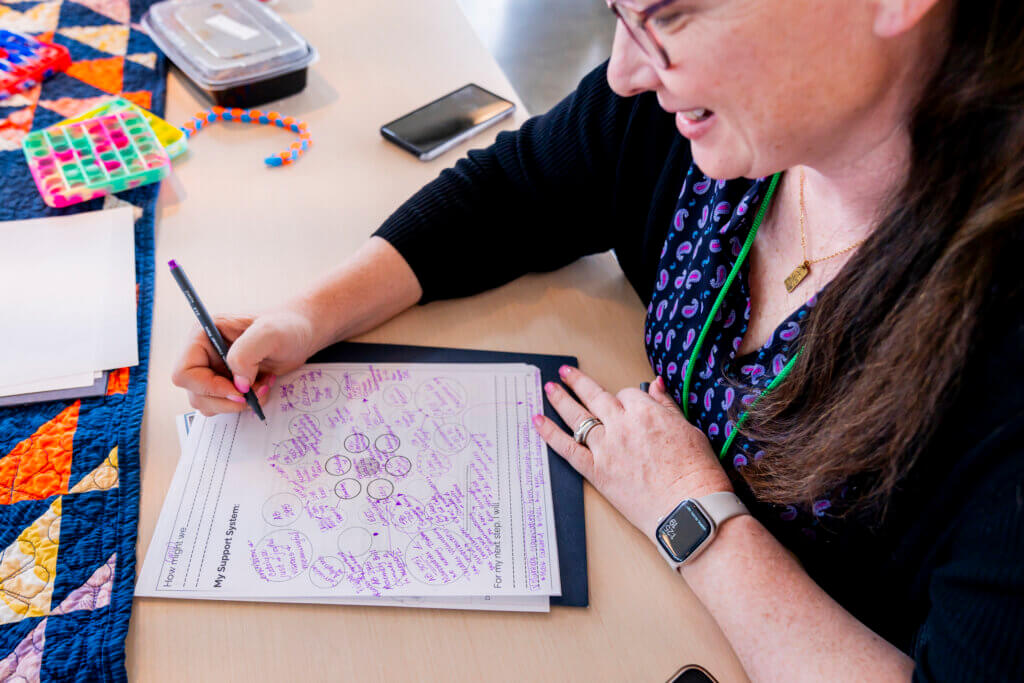Earlier this year, the Exploratorium’s Institute for Inquiry and Teacher Institute teams hosted the K–12 Climate Justice Summit, an event that brought together educators and leaders to explore the intersection of climate science, justice, and education. The summit aimed to empower participants to envision and create classrooms that connect human stories with climate science, enabling students to grasp the impacts of climate change, recognize who is most affected, and understand the shared responsibility in addressing these challenges.

Keynote Insights
The summit featured powerful keynote presentations from Dr. Enrique Salmón, author of Eating the Landscape and Iwígara, and Dr. Mark Windschitl, author of Teaching Climate Change, who each offered unique perspectives on integrating storytelling and systems thinking into climate science education.
Dr. Salmón’s keynote focused on the critical role of storytelling in education, drawing upon his background as an Indigenous scholar and making connections to the timeless art of storytelling practices worldwide. He emphasized that climate change is not just a scientific issue but a social construct that requires us to connect deeply with our values and communities while building relationships with the natural world. Storytelling, according to Dr. Salmón, is a transformative tool that can bridge gaps between people, inspire collective action, and articulate a vision of a more sustainable and just future.
Dr. Windschitl shared narratives and case study examples focused on climate education in K–12 classrooms and facilitated a Climate Fresk workshop that helps participants visualize the systems of climate change, highlighting the importance of understanding the complex interconnections within climate systems. He encouraged educators to see their teaching as a form of continued storytelling, where the narrative of climate change is not just about the problems but also about the solutions and the collective efforts required to address them.
Day One Focus: Storytelling and Systems

Day one of the summit was dedicated to exploring the power of storytelling in climate science education. Dr. Salmón led a workshop that guided participants in identifying connections—between themselves, their communities, and the broader societal responsibilities linked to climate change.
The workshop underscored the idea that data and statistics, while important, are not enough to inspire action. What is needed, Dr. Salmón asserts, is a shift toward kinship ecology, which values the relational aspects that support belonging and in which personal stories and beliefs are central to the narrative. Participants learned how to weave their own stories into their leadership practices, using them as tools to unite and move people towards a common goal.
Key ideas from the workshop included the importance of recognizing the social dimensions of climate change, the power of collective action, and the need for educators to become better agents of change by practicing the art of storytelling.
Day Two Focus: Vision and Action

The second day of the summit shifted towards developing a clear vision and actionable plans for integrating climate justice into education. Participants engaged in group work and interactive sessions that encouraged them to think critically about their roles as conveners and how they could bring the lessons from the summit back to their own contexts.
We also engaged with exhibits on the Exploratorium floor that had specific relationships to climate science and considered what making these connections could look like in participants’ own specific communities. This was followed by sessions designed to help participants create practical steps and form networks of support to implement their ideas.
Reflections and Takeaways
Throughout the summit, participants were prompted to reflect on their own practices and consider how leading with story could transform their approach to climate science education. Reflection questions such as “What role might leading with story play next in your work?” and “What does it look like for climate science education in your region to support a more sustainable, just, and joyful future?” sparked deep discussions and new ideas.
The takeaway from these discussions was clear: educators have a unique opportunity to redefine climate science education by making it more personal, connected, and action oriented. By embracing storytelling and systems thinking, they can inspire students to not only understand the complexities of climate change but also to feel empowered to take action.
Conclusion
The 2024 K–12 Climate Justice Summit was more than just an event—it was an opportunity to support educators in harnessing the power of storytelling and collaboration in their classrooms. As we look to the future, it is essential that we continue to expand our definitions of science and integrate diverse perspectives into our teaching practices. By doing so, we can help students envision and build a future that is not only sustainable but also just and joyful.
Additional Resources
For educators looking to incorporate the lessons from the summit into their own communities of practice, visit www.exploratorium.edu/teaching-climate-change.

